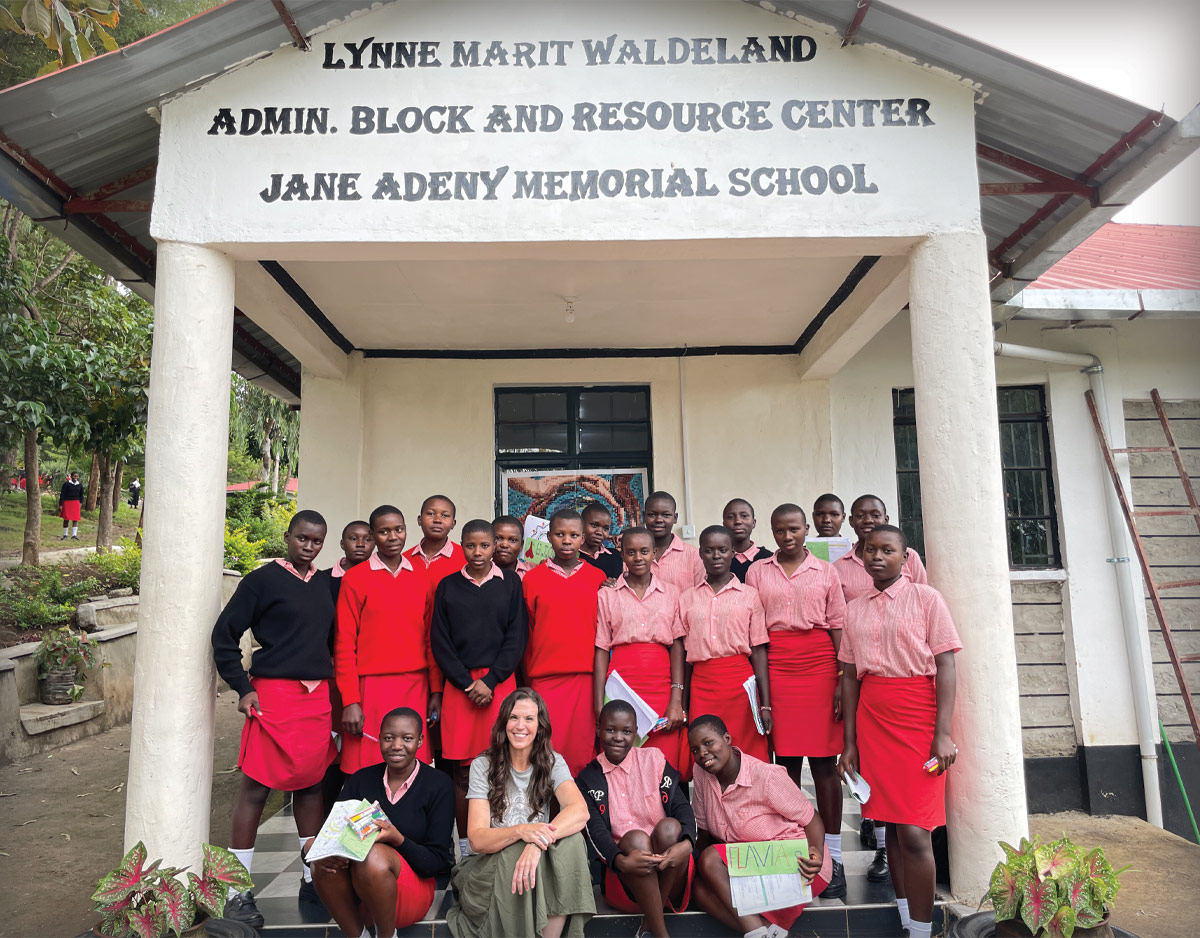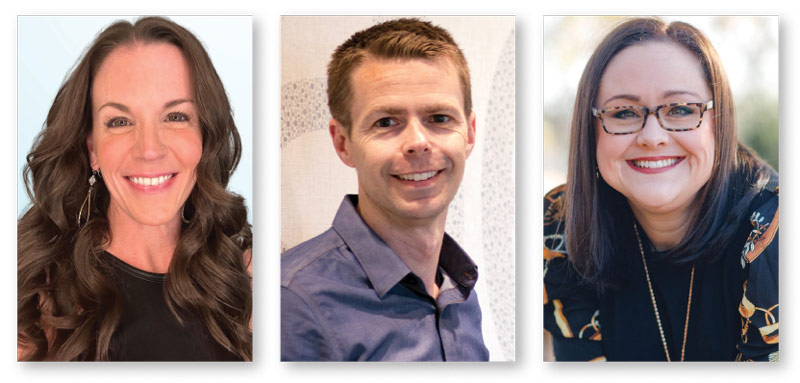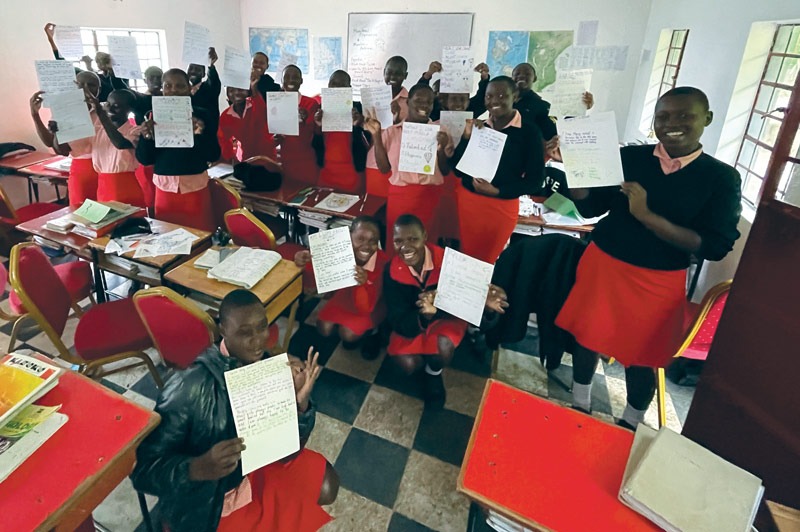Librarians Launch Nonprofit to Support and Build School Libraries Abroad
School librarians Andrea Trudeau, Tom Bober, and Amanda Jones created Librarians Building Libraries, a nonprofit with a mission to “collaborate with library communities worldwide, providing resources, training, and innovative solutions that promote literacy and provide access for all.”
 |
Andrea Trudeau (seated, second from left) with students at the Jane Adeny Memorial School for Girls in Muhoroni, KenyaPhotos courtesy of Andrea Trudeau |
Andrea Trudeau returned from a trip to Africa a different person. Visiting places with such immense poverty “changes you as a human,” she says.
During the summer of 2022, as a Fulbright-Hays scholar, the middle school library information specialist from Illinois spent about six weeks with a group of educators in rural Tanzania and Kenya teaching secondary students at public and private schools.
“You leave realizing that there’s so much work to be done and that being there for [a few] weeks is just barely scratching the surface,” says Trudeau. “I left knowing that there was still something that had to happen there.”
Once home, she shared her experience with friends and fellow school librarians Tom Bober and Amanda Jones. The conversation evolved from Trudeau sharing stories of her travels and teaching to the three of them planning a future project.
“We just kind of decided, ‘Let’s do something about this,’” says Trudeau. “Why can’t we harness our networks and our knowledge and our skills to support the work being done in this area of the world and see what happens?”
The discussion was the start of Librarians Building Libraries, a nonprofit with a mission to “collaborate with library communities worldwide, providing resources, training, and innovative solutions that promote literacy and provide access for all.”
They will begin in Muhoroni, Kenya, with the Jane Adeny Memorial School for Girls (JAMS), where Trudeau taught during her 2022 trip. But it will not end there.
“As we were talking about the JAMS and taking this as an initiative, the conversation really turned to, ‘It doesn’t have to end there, this can be the start of something,’” says Bober.
The elementary school librarian and district library coordinator of Clayton, MO, school district, Bober had long talked about working with Trudeau and Jones on a project. He is excited to now have that chance, but even more so, he wants to learn and respond to the needs of communities around the world.
 |
Andrea Trudeau, Tom Bober, and Amanda Jones |
“The thing that appealed to me was that it was an opportunity not just to share what we can do,” says Bober. “It was a good opportunity to really intensely listen and understand the needs of other spaces and other librarians and other communities, then respond to that in the best way that we could.”
Listening has already been a key part of the planning process. Bober, Jones, and Trudeau want to follow the guidance of Teresa Wasonga, who started JAMS, the all-girls secondary school, and still oversees it.
The school has a library, but it is not catalogued or organized, so getting that done will be part of the project. In addition, Bober, Jones, and Trudeau will add new books to the collection. Most titles in the current library are donated from the United States and feature white characters, Trudeau says. Librarians Building Libraries will add “mirrors” to the collection. The aim is not just to include books in English with Black characters, but books in Swahili and from native writers.
“I want to work with Dr. Wasonga and find a way of supporting a local county,” says Bober. “How can we support local authors?”
The goal is create a love of literature and story in the school.
At bookstores in East Africa, the majority of the titles available are textbooks, Trudeau says, adding that there’s not a lot of literature available, especially for children.
But Librarians Building Libraries won’t just add fiction to the JAMS shelves. Bober is looking to expand the nonfiction collection, which currently consists of informational books in English that are used to study for exams.
“I’m looking at what kind of science books we have that present that type of information in ways that maybe they’re not used to, or ways that will be unique to them, and the value that those bring to their shelves,” he says.
Seeking to sustain library operations after they leave, Trudeau thought they would train the staff. But after speaking with Wasonga, the plan changed.
“Dr. Wasonga said, ‘No, teach my students, because they will carry it on.’”
It made perfect sense to Trudeau when she thought about when she read books to the students during her time at the school. A couple of girls proudly shared that they worked in the school library. When she would give them a book to take to the library, they beamed with pride, she says.
“It’s hard to explain in words the feeling that they showed, just [the] honor and privilege [of being part of the library],” Trudeau says.
There is no set goal for the number of books to bring or other supplies and resources; that will depend on funding and donations.
Bober admits that this kind of fundraising is new to them. The Librarians Building Libraries website has a donation page and has already found some success through an initial announcement to the three librarians’ networks. But they will need to expand beyond that circle.
“I think there’s an opportunity to reach out to publishers directly,” Bober says.
Librarians Building Libraries is also seeking corporate sponsors and is in conversation with several companies, Trudeau says. And the nonprofit already has its first pledged support.
“With the first project taking place in Kenya, Demco will be providing support with products to organize and enhance the library,” Trudeau says.
The plan for fostering a love of story includes adding to the written work done by students, along with sparking a love of the joy of reading. For the most part, the girls learn what they need to so that they can do well on exams. But while Trudeau was on her trip in 2022, the visiting educators expanded the students’ literary experience by giving them a creative outlet they didn’t have previously.
 |
Students hold up their writing. |
“We had the girls write their autobiographies,” says Trudeau. “They had not had that kind of agency before. They never had an opportunity to share their story.”
The students were given journals and, along with asking them to write the story of their lives so far, Trudeau had them write poetry.
“The things they came up with were just profoundly beautiful,” says Trudeau, who believes facilitating this kind of storytelling should be part of the creation of the library and its culture.
Defining the nonprofit’s mission and collaborating with Wasonga to create a plan for this first project seems like a big job, but in some ways it’s the easy part. The logistics create the biggest challenges: funding, collecting books and other goods, as well as getting it all to JAMS in advance of Bober, Jones, and Trudeau arriving for three weeks next summer.
Beyond books, there are needed supplies, such as paper, a printer, bookends, and easels. The organization is working with Wasonga to determine the exact needs. Once they do, they have to find a way to attain and deliver them.
“We’re planning to ship things out in March, because it takes many months to get them there,” says Trudeau.
“I’m excited for loading up suitcases and bringing what we can. This will be the one trip where we have less when we come home.”
When they leave, that will not be the end of the relationship with JAMS.
“We’re going there and spending three weeks [and] we get to see that [library] evolve,” says Bober. “Then we have the opportunity to follow up. My anticipation is we’re going to build this relationship, and we’re going to be able to follow up and know how our time and efforts and listening have impacted that space.”
The ability to build a collection and educate others on how to run a library is just the most obvious of the librarianship skills necessary for this to work. But the intangible skill set of librarians will be invaluable as well.
“This would not be successful without building relationships,” says Trudeau. “That communication and that ability to ask the right questions, to listen to really hear what the needs are, and then meet them where they’re at, that to me is a librarian superpower. I think that’s what we’re bringing to the table.”
Bober agrees that the relationship- building skills are a integral piece of the puzzle to make this endeavor a success, along with the familiarity and experience in the “service leadership” role that they each carry out in their daily jobs.
“It’s something that we put into practice every day in a lot of different ways, whether we’re working with our students, with our staff, with our community,” says Bober.
RELATED
The job outlook in 2030: Librarians will be in demand
The job outlook in 2030: Librarians will be in demand
ALREADY A SUBSCRIBER? LOG IN
We are currently offering this content for free. Sign up now to activate your personal profile, where you can save articles for future viewing






Add Comment :-
Be the first reader to comment.
Comment Policy:
Comment should not be empty !!!